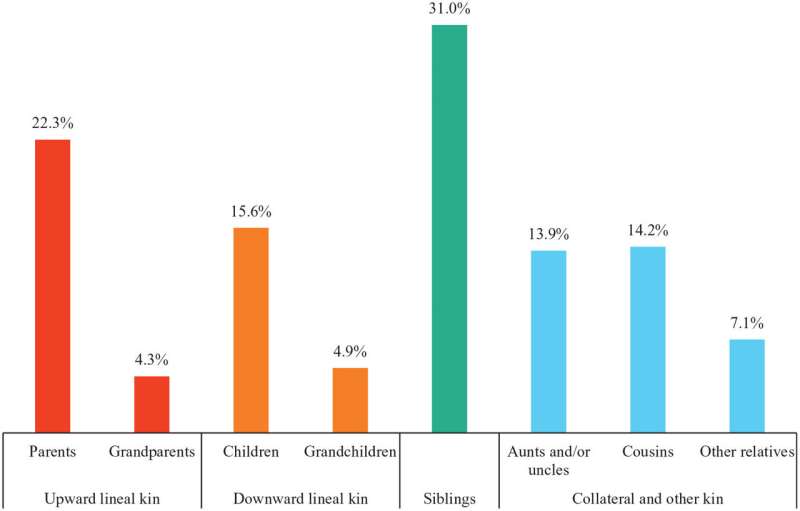This article has been reviewed according to Science X's editorial process and policies. Editors have highlighted the following attributes while ensuring the content's credibility:
fact-checked
trusted source
proofread
Extended kin can play an important role in times of crisis, research finds

Extended family members may play a significant role in peoples' lives during extreme events, an important finding in new research led by an Emory University sociologist.
"Often, surveys don't ask about relationships with extended kin. The focus is on the nuclear family," says Megan Reed, first author on the recent paper, "Communication with Kin in the Wake of the COVID-19 Pandemic" published in Socius: Sociological Research for a Dynamic World.
"This research shows us that people have a pretty large network that they activate in times of crisis," adds Reed, who is an assistant professor of sociology in Emory College of Arts and Sciences.
Reed and her co-authors from New York University-Abu Dhabi, the University of New Hampshire and the University of Pennsylvania previously argued for more research on the role of "extended kin" such as aunts and uncles in family relationships.
They joined forces with researchers running the Robin Hood Poverty Tracker at Columbia University, to include questions about those relationships in a phone survey that took place shortly after COVID-19 hit the U.S.
Their study documents how often more than 2,300 New Yorkers communicated with "non-coresident kin" following the first wave of the pandemic in 2020. The terminology refers to any family members not residing in the same household, from adult siblings and parents to more distant kin such as cousins.
Among key findings:
- About 49% of their sample increased communication with non-coresident kin since the pandemic began. Nearly a third reported increasing communication with siblings, which was the relationship that saw the greatest jump.
- About 56% of the respondents reported speaking to family outside their household several times a week.
- Slightly more than 14% of people increased communication with cousins, while slightly less than 14% increased communication with aunts and uncles.
Researchers did not find any variation by age, which suggests that much of the communication was intergenerational or that the impact of the pandemic on family relationships was similar across different age groups.
Beyond age, though, there were other demographic differences. Black and Hispanic respondents were more likely to report increased communication, for instance, as were foreign-born respondents and women.
The survey did not attempt to characterize how the communication occurred, though Reed says other research has shown an increased use of group chats and phone calls when the pandemic limited in-person gatherings.
It also does not address the nature of the communication, such as what respondents discussed during the exchanges.
Reed hopes to incorporate the research into her teaching, such as her "Sociology of the family" course next spring. The class includes extended family relationships in its examination of family as a social institution.
"Family relationships can play an important role in resiliency in the face of crisis," Reed says. "Our study provides new evidence of the activation of these relationships during the COVID-19 pandemic."
More information: Megan N. Reed et al, Communication with Kin in the Wake of the COVID-19 Pandemic, Socius: Sociological Research for a Dynamic World (2023). DOI: 10.1177/23780231231199388
Provided by Emory University





















